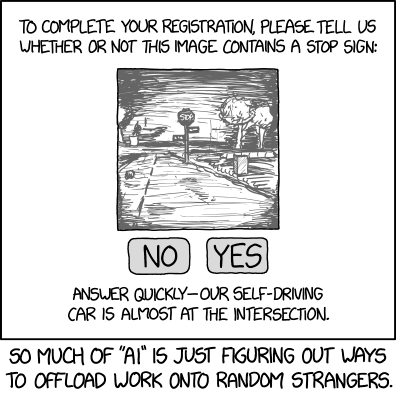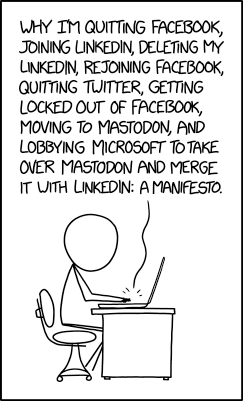The Mythology of Silicon Valley
As I still stew over being unable to get my picture removed from a stranger’s profile, I’ve been thinking about the myths underpinning tech companies.
It looks that much of the media and society have swallowed Silicon Valley’s marketing schtick. Rather than great technological innovation and relentless hard work, Silicon Valley is the same old trope of tax evasion, exploitative labor practices and privatizing profit while socializing loss.
Labor
Much of the ‘innovation’ among tech companies is just cheap labor. Uber is cheaper than a cab in the US because the driver is hardly making any money, has no pension, no insurance and zero job security. The same goes for the Amazon warehouse employees that have to piss in a bottle, so they can hit their data-driven KPIs. Let’s not forget that the Chinese factory that makes iPhones had to install nets around the building because so many employees were killings themselves by jumping off the roof.
The tech utopia that we see is powered by an out of sight underclass that. Massive inequality is a feature of any economic ‘revolution’. Let’s drop the techno-utopian nonsense, and start talking about solving the real political and economic problems of the day. No, creating another fucking app isn’t the answer. I wonder why I can buy cruelty free eggs, but I can’t buy a cruelty free phone.
‘Innovation’
There ain’t nothing more hyped than AI. Companies claim to use AI when all they’re doing is using cheap overseas labor.
Or to put it more directly:

There’s nothing wrong with brute force engineering. I take issue with pretending that our tech is from some Jetsons fantasy without any public discussion. Society is throwing a massive amount of human and material resources at technology that is arguably little more than a parlor trick. Is it worth it?
The taxpayers always foot the bill
The initial research that created the internet came from US government money. Google’s search algorithm was developed under a grant from American taxpayers. Without the steady stream of engineers educated at public expense, there would be no silicon valley.
We constantly hear that evil big government is stifling innovation. It’s a curious claim since I don’t see Google or Amazon scoping out a new office in Somalia or Western Sahara.
Tech companies are leeches. They suck the best and the brightest from society, are happy to use government funded infrastructure but kick and moan at any tax or oversight. This is classic privatizing profit while socializing losses.
Responsibility
PBS’s new documentary about Facebok is worth watching, even if it only scratches the surface. What comes out clearly is that nobody intended for Facebook to be evil. From day one there was a utopian vision that connecting people would solve the world’s problems. Even as Facebook is unravelling, senior management sees the only solutions to their problems in continuing to connect people. It’s the naïveté of a religion.
This is all fine and good. When I was a teenager I had plenty of childish fantasies. There’s a key difference though: Facebook and other tech companies aren’t being held responsible for their actions.
Myanmar is the prime example of FB being completely incompetent. The platform became the key medium for hate speech to spread and intensify while the military carried out a brutal campaign of ethnic cleansing. Facebook was unable to provide any content moderation due to the simple fact that nobody at the company spoke any of the local languages. To this day, FB faces no criminal liability for this gross negligence.
Facebook’s annual revenue per user is barely over $5. If FB were held accountable for what happens on its platform — and this would mean they’d need many more human content moderators and could only accept money for ads and promoted posts from reputable sources — I don’t think Facebook would still be a profitable company. If Uber and AirBnB had to pay their fair share of taxes, comply with local laws and were held responsible for actions taken involving on platforms — would they be able to turn a profit?
Boycotting
The dream of free and open source software is alluring, but most non-techies can barely use their iPhones. So that leaves me sort of like this guy:

With that in mind, there are degrees of evil and some alternatives:
- Facebook is both the worst and easiest to walk away from.
- DuckDuckGo has completely replaced Google Search for me.
- Amazon is a cesspool of fake products and reviews; I use it only for ebooks.
I don’t see a replacement for the Apple / Microsoft duopoly. A least they are the most tolerable of the bunch since they’re not just ad sellers and middlemen.
On some level, Apple even gets it. Human-curated Apple News doesn’t have the potential to inflame and spread falsehoods like social media. It even works well with my system of staying informed without constant news. Out of the box, iOS and OS X are the most privacy focused of the major operating systems. I’m no fanboy; I use Apple because they are the least bad option for now.
The solution is political
Technology won’t solve political problems. My personal choices can protect my privacy, and I can mostly avoid the companies I dislike the most. That’s not a societial solution, though.
The only solution is voting. Find candidates that are willing to standup to tech companies, demand fair wages and privacy. It took one Vermont senator to get a huge concession on wages out of Bezos. Imagine if we were as energized about labor as the Right is about the imminent threat of brown people.
Addendum: the targeting categories that Facebook lets advertisers select are automatically generated. Until journalists uncovered it, you could reach out speficially to those segmented as white genocide conspiracy theory. I’m sure FB saves a ton of money by algorithmically segmenting users, but at some point we need to ask whether a company should be allowed to sell a product not a single human employee has reviewed.